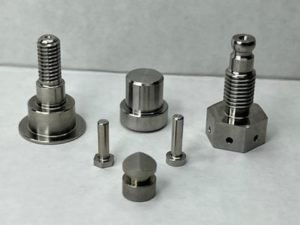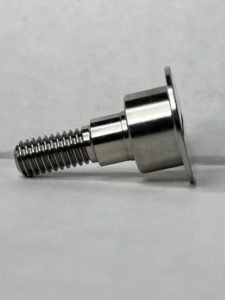11 Hard Materials Used in Swiss Precision Machining
There’s a misconception out there that Swiss screw machines can’t handle high-density aerospace materials like nickel and cobalt.
That may have been true 20 years ago. But Swiss precision machining has progressed so much in the past two decades that the machines can now turn hard materials just as effectively as conventional turning equipment. The problem is that many shops lack the willingness and expertise to work with these materials.
At United Centerless Grinding and Thread Rolling, working with hard materials is our bread and butter. Our centerless grinding and thread rolling capabilities combined with our Swiss precision machining capabilities allow us to deliver incredibly durable parts quickly and cost-effectively.
Check out this list of 11 hard materials used in Swiss precision machining, and find out why we have what it takes to machine hard materials.
Hard Materials Used in Swiss Precision Machining
A-286. This nickel and iron-based alloy steel is extremely hard and can withstand temperatures up to 1,300 degrees Fahrenheit. It’s most useful for applications that require high strength and corrosion resistance.
Nickel 400. Because it’s immune to chloride-induced corrosion cracking, Nickel 400 thrives in alkaline environments ranging from sub-zero temperatures up to 1,000 degrees Fahrenheit.
Nickel 500. Twice the strength of Nickel 400, this material is one of the hardest nickel-copper alloys available. The addition of titanium guarantees optimum durability.
Nickel 600. This dense nickel-chromium alloy is known for resisting oxidation in temperatures up to 2,000 degrees Fahrenheit. Its high strength and relative workability make it an incredibly versatile material for applications like roller hearths and other furnace components.
Nickel 625. Precipitation hardening may be necessary to increase the yield strength of malleable materials. But due to Nickel 625’s unique alloy matrix, this type of treatment isn’t required.
Inconel. Also known as Nickel 718, Inconel is a readily available, high-strength nickel-chromium alloy with outstanding corrosion resistance. It’s ideal for parts that will undergo tremendous strain, like the internal components of a jet engine.
Cobalt L605. Well-suited for wet, marine environments, this cobalt-chromium-tungsten-nickel alloy is exceptionally corrosion and sulfidation resistant, meaning it fights deterioration when exposed to sulfur.
Alloy X. Capable of withstanding temperatures up to 2,000 degrees Fahrenheit, Alloy X is an excellent choice for high-heat applications, like furnace components. It’s also widely used for gas turbine engine components because it’s resistant to reducing and carburizing atmospheres.
Alloy C-276. A small amount of tungsten is combined with this nickel-molybdenum-chromium alloy to offer added corrosion resistance for use in harsh chemical environments. It’s a superior choice for food processing applications.
MP35N. This nonmagnetic, nickel-cobalt alloy combines high tensile strength with impressive corrosion resistance. It’s capable of fighting stress corrosion cracking, making it a solid choice for heavy-duty applications in oil equipment and engines.
Kovar. With a coefficient of thermal expansion (i.e., the tendency for an object to expand or shrink with a temperature change) similar to that of hard glass, this iron-nickel-cobalt alloy is well-suited for applications requiring a tight seal between metal and glass parts.
Depending on the material's tensile strength, we can also machine other hard materials, such as certain titanium alloys, with our Swiss screw machines.
Our Expertise in Machining Hard Materials
At United Centerless Grinding & Thread rolling, our in-house capabilities and team of Swiss turning pros position us to machine hard materials better and faster than the competition.
We can transform hard material bar stock to a complete, finished product with our grinding, thread rolling, and Swiss precision machining capabilities. We start these parts on one of our highly efficient Swiss Screw machines, then pass them on to centerless grinding or thread rolling to create intricate forms and hold exceptionally close tolerances. Combining these processes all under one roof allows us to maximize speed and optimize part cost for our customers.
Of course, it’s not just our equipment that makes us great—it’s the people who use it. Hard materials are notoriously difficult to machine, but they’re no match for the United CGTR team. Our machinists have years of experience carefully monitoring hard materials and adjusting feeds and speeds to protect tooling and prevent scrapping.
When you need a shop to machine your hard materials, United Centerless Grinding & Thread Rolling is here to deliver. Request a free estimate today!


